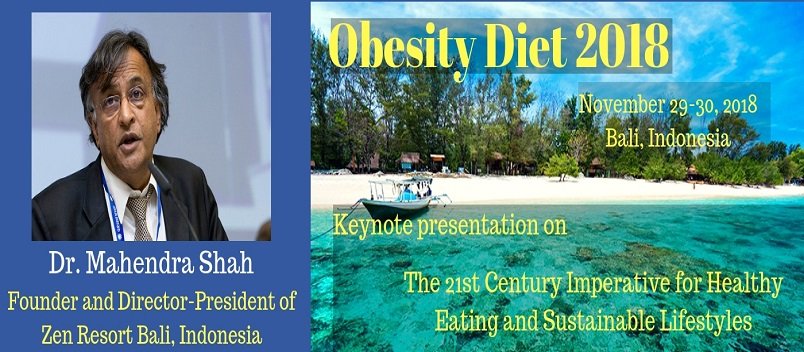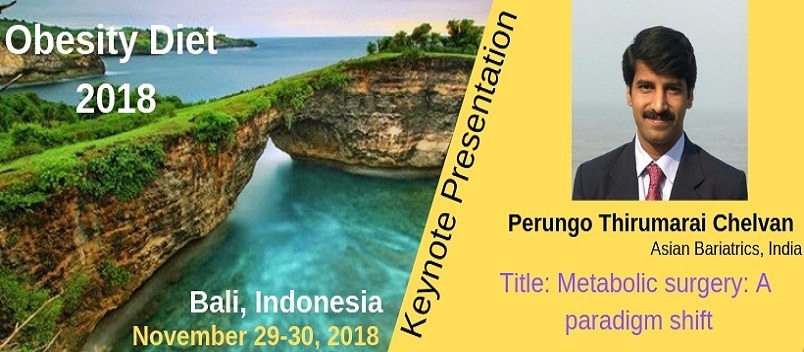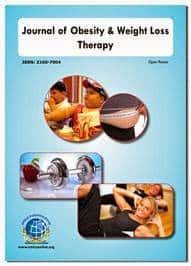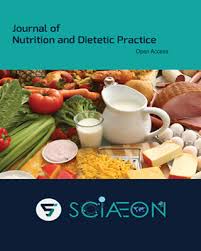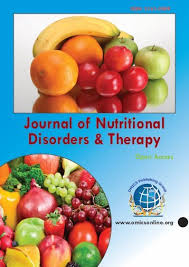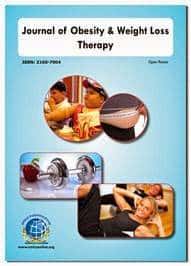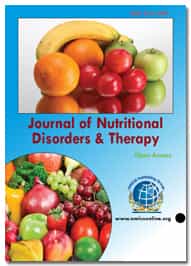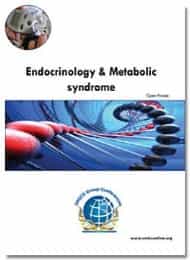Theme: Prevention of Obesity by Nutrition and Daily Physical Activities
Obesity Diet 2018
ME Conferences extends warm welcome to International Conference on Obesity and Diet Imbalance on November 29-30, 2018 Bali, Indonesia with a theme “Prevention of Obesity by Nutrition and Daily Physical Activities”. Participating at Obesity Diet 2018 will provide an exceptional opportunity to interact with world-class Obesity Specialists and Endocrinology Experts in the field creating a channel for collaborations and partnerships.
Obesity Diet 2018 is a worldwide stage to examine and find out about Weight Management, Childhood Obesity, Anti-obesity drugs, Obesity & Cancer, Genetical Obesity, Obesity and Diabetes, Advanced medications for Obesity, Health Behavior and Environment, Basic nourishment and diet, Bariatric treatment, Scientific gatherings and meetings and the field of Obesity. Obesity and Endocrinology Meetings would talk about different themes identified with Neuro Endocrinology, Metabolic Syndromes and Anorexia, Pediatric Endocrinology, Reproductive Endocrinology and Current Advances in Endocrinology Metabolism. Current Obesity Conferences 2018 has taken the start to assemble the world-class specialists both from industry and scholarly in a typical stage at Obesity Conferences.
Who can attend?
Obesity Diet 2018 brings together individuals who have an interest in different fields of Obesity like Obesity, and its Causes, Anti-Obesity Drugs, Childhood Obesity Effects, Obesity and Diabetes, Obesity and Endocrinology, Bariatric Surgery, Obesity in Teens and Adolescents, Dietary and Lifestyle changes, Genetics of obesity, Gynecology & Obstetrics, Obesity & Metabolic Disorders, Diet & Nutrition, Obesity in Real Life, Current research on Obesity.
Why to Attend:
Upcoming Obesity Diet 2018 gives the examination works of Obesity Symposiums 2018 and Obesity Workshops 2018 aptitude from different logical foundations and the same can be seen by youthful scientists and understudies. Obesity Conferences 2018 predominantly means to declare learning in course of research work and in this way would be an ideal scene to share and create information on key instruments.
Target Audience:
- Basic Clinical Research Scientists & Students
- Metabolic & Bariatric Surgeons
- Physicians
- Integrated Health Professionals
- Registered Dieticians & Nutritionists
- Diabetes Educators
- Physical Therapists
- Industry Professionals
- Yoga & Fitness Professionals
- Medical Colleges
- Obesity & Endocrinology Associations and Societies
- Business Entrepreneurs
- BMI Training Institutes
- Health Promoters
- Public Health Professionals
- Pharmacists
Track 1: Obesity and its Causes
Obesity is a condition where excess body fat has accumulated to such an extent that it can cause a negative effect on health. It is a clinical situation in which a person has increased so much fat that it would have a negative effect on their fitness and health. People are usually thought as overweight once their body mass index (BMI), a measuring obtained by dividing a individual’s weight by the sq. of the person's height, is over thirty kg/m2, with the vary 25–30 kg/m2 defined as overweight. It is most commonly caused by a combination of lack of physical activity, excessive food intake and genetic susceptibility. It is mostly preventable through a combination of exercise, social changes and personal choices. Obesity may be a leading avoidable explanation for death worldwide, with increasing rates in adults as well as kids.
Track 2: Genetics of Obesity
Obesity is very heritable. Obesity can be a complicating disorder resulting from the interactions of a wide variety of hereditary and environmental factors. Polymorphisms in various genes responsible for appetite and metabolism are vulnerable to obesity under certain dietary conditions. One gene mutation, the melanocortin 4 receptor, may be responsible for tens of thousands of cases of obesity. Monogenic type of genetic mutation can result in severe forms of obesity that run in families. Occurrences of monogenic kinds of overweight are evidence that obesity may be caused by genetic mutations. The most common forms of obesity are largely the result of disparity within a large number of genes.
Track 3: Nutritional Imbalance
Nutritional imbalance is caused by inability of the body to absorb certain nutrients or may result from a poor balanced diet. Based on the supply of nutrients, little or excess, imbalances create unpleasant side effects and conditions that could lead to serious disease. Some levels of macro- and micronutrients in your daily diet are needed and some foods you don’t need at all. In case you are up to some special diet plans, consult a nutritionist or a healthcare provider in advance just to ensure whether you are get a balanced amount of all essential nutrients.
Track 4: Nutrition and Health in Women and Children
For children nutrition is based on the same principles as nutrition for women and adults. However, children need different amounts of specific nutrients at different ages.On the other hand; women have often tried to make up deficits in their diet though the use of vitamins and supplements. However, these supplements can be used as a safeguard against occasional nutritional downfall, but can’t be remunerated for an unbalanced or unhealthy diet. To ensure you get all the nutrients you need from the food you eat, try to aim for a diet rich in fruit, vegetables, healthy fats, quality protein and low in processed, fried, and sugary foods.
Track 5: Food Technology and Nutrition
Food technology is a fast developing field dealing with the principles and the techniques that are involved in the processing and preserving food substances. Food technology is now used to treat obesity by providing consumers with an increased variety of tasty, appealing foods that are lower in portion size and/or energy density than standard products. Super foods are now main focus of interest for scientist and researchers which does not spoil for a long time and provide high nutritional value.
Track 6: Imbalanced Diet: Effects and Causes
An imbalanced diet supplies you with either more or fewer of certain restricted nutrients your body needs whereas balanced diet involves consuming variety of food and gaining the optimal amount of calories which is required by the body. Imbalanced diet means an excess or deficiency of dietary part, such as: proteins, fat, carbohydrates, fibres, vitamins, minerals. Eating wrong type of food is potential cause of a dietary imbalance.
Track 7: Eating Disorders
Eating disorder is a condition in which a person intakes excessive food which affects a person's physical as well as mental health. It describes illnesses that are characterized by irregular eating habits which severe stress or concern about body weight or shape. It can develop during any stage in life but appears in teens and young adulthood.
Track 8: Anti-Obesity Drugs
Anti-obesity drugs are used as pharmacological agents that reduce or control weight. These drugs change one of the fundamental processes of the human body or weight regulation by altering either appetite or absorption of calories. However, the conventional and healthy treatment for overweight and obese individuals is dieting and physical exercise. The ideal anti-obesity drug would produce sustained weight loss with minimal side effects. The mechanisms that regulate energy balance have substantial built-in is sacking, overlap considerably with other physiological functions, and are influenced by social and psychological factors that limit the effectiveness of pharmacological occurring.
Track 9: Endoscopic Treatment for Obesity: New Emerging
Technology Trends
The endoscopic approach may have the potential for less encroaching intervention in obesity treatment, with appropriate weight loss, reduced morbidity, and easy access for obese patients. According to recent research, bariatric surgery despite being minimally invasive leads to complications in approximately 15% of patients, and is used by only 1% of patients. It can be performed through a simple endoscopic procedure which can be reversible by the use of a suture technique, aspiration therapy. The endoscopic method of treatment is used for persons facing obesity with varying degrees of obesity, and has the potential to provide a more cost-effective outpatient procedure for the increasing population of people with obesity and the metabolic syndrome.
Track 10: Balanced Diet and Chronic diseases
Good health is maintained when a diet contains the proper proportions of carbohydrates, fats, proteins, vitamins, minerals, and water. Thus, Balanced diet is referred to as balanced diet the one that gives our body all the required essential amounts of nutrients which it need to run efficiently. Chronic disease is disease that persists over for an extended period of time. Chronic diseases will hinder independence and also the health of individuals with disabilities, because it could produce further activity limitations. Individuals with chronic disease often assume that they're free from the illness once they have no symptoms. Chronic diseases are liable for seven of 10 deaths annually. Chronic diseases tend to become additional common with age. These diseases typically cannot be prevented by vaccines or cured by medication. Several chronic diseases are linked to fashion choices that are among your own hands to vary.
Track 11: Prevention and Consequences of Obesity
To avoid weight and keep up a sound body weight, eat well-balanced count calories and work out regularly. Preventing weight is imperative. Once fat cells shape, they stay in your body until the end of time. In spite of the fact that you'll diminish the measure of fat cells, you cannot get freed of them. Thus, Obesity can only be prevented by staying away from eating disorders and by changing sedentary lifestyle and indulging in regular exercises. The consequences include:
Track 12: Healthy Nutritional Science and Metabolism
Great nourishment, physical action, and a solid body weight are basic components of a person’s in general well-being. Both, these will less encourage a person’s hazard of creating genuine wellbeing conditions, such as, high cholesterol, diabetes, stroke, and cancer. Nourishment is a fundamental buy for understudies of nourishment and dietetics, additionally for those understudies who major in other subjects that have a nourishment component, such as nourishment science, pharmaceutical, drug store and nursing. Experts in nourishment, nourishment science, medication, wellbeing sciences and numerous related ranges will too discover much of awesome esteem inside its covers.
Track 13: Healthy Eating and Living
A combination of more physical exercise and a reasonable supplement wealthy but vitality controlled eat less is prescribed for overweight or stout grown-ups who wish to lose weight. Standard physical action decreases the chance for numerous illnesses, makes a difference control weight and fortifies muscles, bones and joints. Individuals are subordinate on high fat and calorie, uncommonly alluring and humble food. Conduct is one of the components influencing weight choose up. Learned hones like utilizing edibles to precise adore, eating by ignoring body signals incite weight
Track 14: Exercise, Yoga and Hypnotherapy
Exercise is considered a suitable approach for improving and preserving physical and emotional fitness. Regular and non-stop yoga exercise is one of the maximum critical nonpharmacological strategies of enhancing serum lipid concentrations, adipose tissue, and metabolic syndrome elements. Body weight, percentage of body fats, lean body mass, body mass index, waist circumference, and visceral fats area might be extensively reduced. Yoga exercising improves adiponectin level, serum lipids, and metabolic syndrome hazard factors in overweight postmenopausal girls. Consequently, yoga exercising can be powerful in stopping cardiovascular ailment caused by obesity
Track 15: Weight Management and Weight Loss Medication
Modern weight management helps in optimization of health and risk factors, irrespective of weight change short-term weight loss, and long-term prevention of weight gain. Promoting consumption of a variety of nutritious foods. Recommend avoidance of high calorie foods and sugar sweetened beverages helps in weight management. A structured programme addressing diet and physical activity and behavioural management are used.
Track 16: Bariatric Surgery and Weight Loss
Bariatric surgery popularly known as weight loss surgery includes a variety of procedures performed on people who are suffering from obesity. Bariatric surgery is an option if there is a severe obesity and an individual does not lose enough weight to improve their health using other methods or have serious obesity-related health problems.
Bariatric Surgery can be attained by either of three processes: Gastric bypass, gastric band, and gastric sleeve. These process involves resecting and re-routing the small intestine to a small stomach pouch (gastric bypass surgery), through removal of a portion of the stomach (sleeve gastrectomy) or reducing the size of the stomach with a gastric band.
Bariatric surgery is an effective way to improve many health problems related to obesity, such as type 2 diabetes, high blood pressure, unhealthy cholesterol levels, and sleep apnea. Bariatric Surgeries are proved to improve physical function as well as mood and provide with better quality of life.
Bariatric surgery may cause also side effects like infection, diarrhoea, and nutritional shortages, gallstones, and hernias right after or later the surgery.
Why in Indonesia?
Obesity is becoming a serious issue in many developing countries, with negative implications for economic growth and human well being. Over the past 20 years, obesity has increased remarkably in Indonesia across all population groups, including rural and low income strata. The problem is particularly severe among women. While the prevalence of under nutrition in young children decreased over the past 14 years in Indonesia, more children are becoming overweight. Panel regressions confirm that changing food consumption patterns, coupled with decreasing physical activity, directly contribute to this trend.
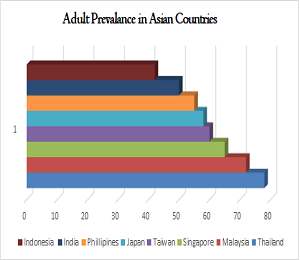
Importance and Scope:
This event is expected to present an outstanding spectrum of research from different countries bringing together collective solutions. This Obesity diet 2018 will be of interest to anyone concerned in learning, sharing issues and experiences regarding Obesity & its related areas of Medicine & Health Care. This Obesity meeting fetches leading and experienced Metabolic and Bariatric Surgeons, Physicians, Basic and Clinical Research Scientists, Integrated Health Professionals, Registered Dieticians and Diabetes Educators, Physical Therapists, Students, Industry Professionals, Fitness Professionals and Health Promoters and many more.
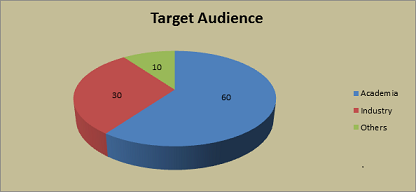
Members Associated with Obesity 2018:
- Doctors
- Dieticians
- Health Organizers
- Clinical Research Scientists
- Public Health Professionals
- Others
Obesity Associations and Societies: World
- European Association for the Study of Obesity (EASO)
- World Obesity Federation
- Global Obesity Prevention Center
- World Health Organization
- World Heart Federation
- The International Association for the Study of Obesity
- The International Diabetes Federation
- The International Pediatric Association
- The International Union of Nutritional Sciences
- The International Development Research Centre
Major Universities Associated with Obesity Research Across the Globe:
- Harvard University, USA
- University of California, USA
- University of North Carolina, USA
- University of Helsinki, Finland
- Yale University, USA
- University of Texas, USA
- University of Pennsylvania, USA
- University of Pittsburgh, USA
- Osaka University, Japan
- University of Minnesota, USA
- Johns Hopkins University, USA
- Columbia University, USA
- University of Washington, USA
- Arizona State University, USA
- University of Johannesburg, South Africa
- Ain Shams University, Egypt
- North-West University, South Africa
- University of Cape Town, South Africa
- Stellenbosch University, South Africa
- University of the Witwatersrand, South Africa
- The American University in Cairo, Egypt
- University of KwaZulu-Natal, South Africa
- Rhodes University, South Africa
- University of Pretoria, SouthAfrica
- Cairo University, Egypt
Related Conferences:
Annual Child and Family Healthcare Nursing Conference, August 13-14, 2018 Bali, Indonesia
World Congress on Nutrition and Obesity Prevention, October 8-9, 2018 Dubai, UAE
International Conference on Obesity and Chronic Diseases, October 15-16, 2018 Dubai, UAE
International Conference on Pediatric Nursing and Healthcare, October 15-16, 2018 Abu Dhabi,UAE
Middle East Obesity, Bariatric Surgery and Endocrinology Congress, June 25-26, 2018 Dubai, UAE
19th World Obesity Congress, July 10- 11, 2018 Bangkok, Thailand
21st International Conference on Food & Nutrition, July 25-26, 2018 Vancouver, Canada
21st World Congress on Nutrition & Food Sciences , July 09-10, 2018 Sydney, Australia
5th World Congress on Public Health, Nutrition & Epidemiology, July 23-24, 2018 Melbourne, Australia
19th Diabetes Conference, July 20 - 22, 2018,Melbourne, Australia
14th Euro Obesity and Endocrinology Congress September 13-14, 2018 London, UK
Annual Congress on Nutrition & Healthcare , Oct 18-20, 2018 Paris, France
Related Societies:
Europe:
European Association for the Study of Obesity, Europe; International Union of Food Science & Technology, Europe, Association of European Cancer, Europe, European Childhood Obesity Group (ECOG), Europe; Austrian Nutrition Society, German Nutrition Society, Finnish Society for Nutrition Research
USA:
Canadian Digestive Health Foundation, USA; National Research Council, USA; Canadian Nutrition Society, USA; American Society for Parenteral and Enteral Nutrition (A.S.P.E.N.), USA; Canadian Obesity Network, USA; Canadian Society for Exercise Physiology, USA; American Council of Science and health; American Society of Anaesthesiologists
Asia-pacific:
The Nutrition Society of Australia, Asia; Academy for Eating Disorders; The Korean Nutrition Society, Asia; Dietitians Association of Australia, Asia; Nutrition Society of Malaysia, Asia, The Nutrition Society of Australia, Asia; The Korean Nutrition Society, Asia; The Endocrine Society of Australia
Middle East:
Obesity and Metabolic Surgery Society, Annual Gulf Obesity Surgery Society, The Nutrition Society, Pediatric Endocrine Society, Metabolic and Endocrine Society
Obesity & Fitness Expo 2017
17th World Fitness Expo & 16th International Conference & Exhibition on Obesity & Weight Management hosted by Conference series LLC LTD was held during November 13-15, 2017 in Atlanta, USA with the theme "Optimize your health with fitness & current advancement in fitness training & To Share Preventive & Management Strategies for Obesity." Active participation of Kinesiologist, Sport scientist, Physiotherapist, Fitness trainers, Nutritionist from the fields of Kinesiology, Fitness & Exercise, Nutrition is highly appreciated and made this event a blast.
The meeting covered various sessions, in which the discussions included the scientific tracks.
- Obesity and Weight management
- Exercise & Sports Science
- Childhood obesity
- Fitness Research & Development
- Physical Fitness
- General Fitness Training
- Innovations in Fitness Exercise
- Obesity and Endocrinology
- Obesity and Overweight
- Control and prevention of obesity
- Kinesiology & Musculoskeletal Development
- Physical Therapy
- Factors affecting body's fitness
- Pharmacology and Obesity
- Liposuction and Advanced Weight Loss Treatments
- Fitness Nutrition
- Athletic Performance
The conference was initiated with a series of lectures delivered by both Honorable Guests and members of the Keynote forum. The list included:
- Robert G LeFavi, Armstrong State University, USA
- Marialice Kern, San Francisco State University, USA
- Aniceto Baltasar, 2012 IFSO President, 2011 Outstanding Achievement award Finalist, Spain
- Jose Palomar Lever, P-DTR Global AG, Switzerland
- Sandy Weston, Weston Fitness, USA
- John Ebnezar, Orthopedic surgeon, India
- Joycelyn M Peterson, Oakwood University, USA
- Lynn R Jacobs, Southern Methodist University, USA
- Amy Arrow Articolo, Obesity Treatment Foundation, USA
- Angelia Holland, Augusta University, USA
All the above mentioned Honourable Guests and keynote speakers gave their energetic and fruitful contributions at Obesity & Fitness Expo 2017.
ME Conferences offers its heartfelt appreciation to all the speakers who have attended and obliged to the Organizing Committee Members, adepts of field, various outside experts, company representatives and other eminent personalities who supported the conference by facilitating the discussion forums. ME Conferences also took privilege to felicitate the Organizing Committee Members who supported this event.
Let us meet again @ Obesity Diet 2018
Conference Highlights
- Obesity and Its Causes
- Nutritional Imbalance
- Food,Technology and Nutrition
- Weight Management and Weight loss Medication
- Genetics of Obesity
- Anti-Obesity Drugs
- Healthy Nutritional Science and Metabolism
- Endoscopic Treatment for Obesity: New Emerging Technology Trends
- Balanced Diet and Chronic Diseases
- Eating Disorders
- Nutrition and Health in Women and Children
- Imbalanced Diet: Effects and Causes
- Prevention and Consequences of Obesity
- Healthy Eating and Living
- Exercise,Yoga and Hypnotherapy
- Bariatric Surgery and Weight Loss
To share your views and research, please click here to register for the Conference.
To Collaborate Scientific Professionals around the World
| Conference Date | November 29-30, 2018 | ||
| Sponsors & Exhibitors |
|
||
| Speaker Opportunity Closed | Day 1 | Day 2 | |
| Poster Opportunity Closed | Click Here to View | ||
Useful Links
Special Issues
All accepted abstracts will be published in respective Our International Journals.
- Journal of Obesity & Weight Loss Therapy
- Journal of Nutritional Disorders & Therapy
- Journal of Nutrition and Dietetics
Abstracts will be provided with Digital Object Identifier by




